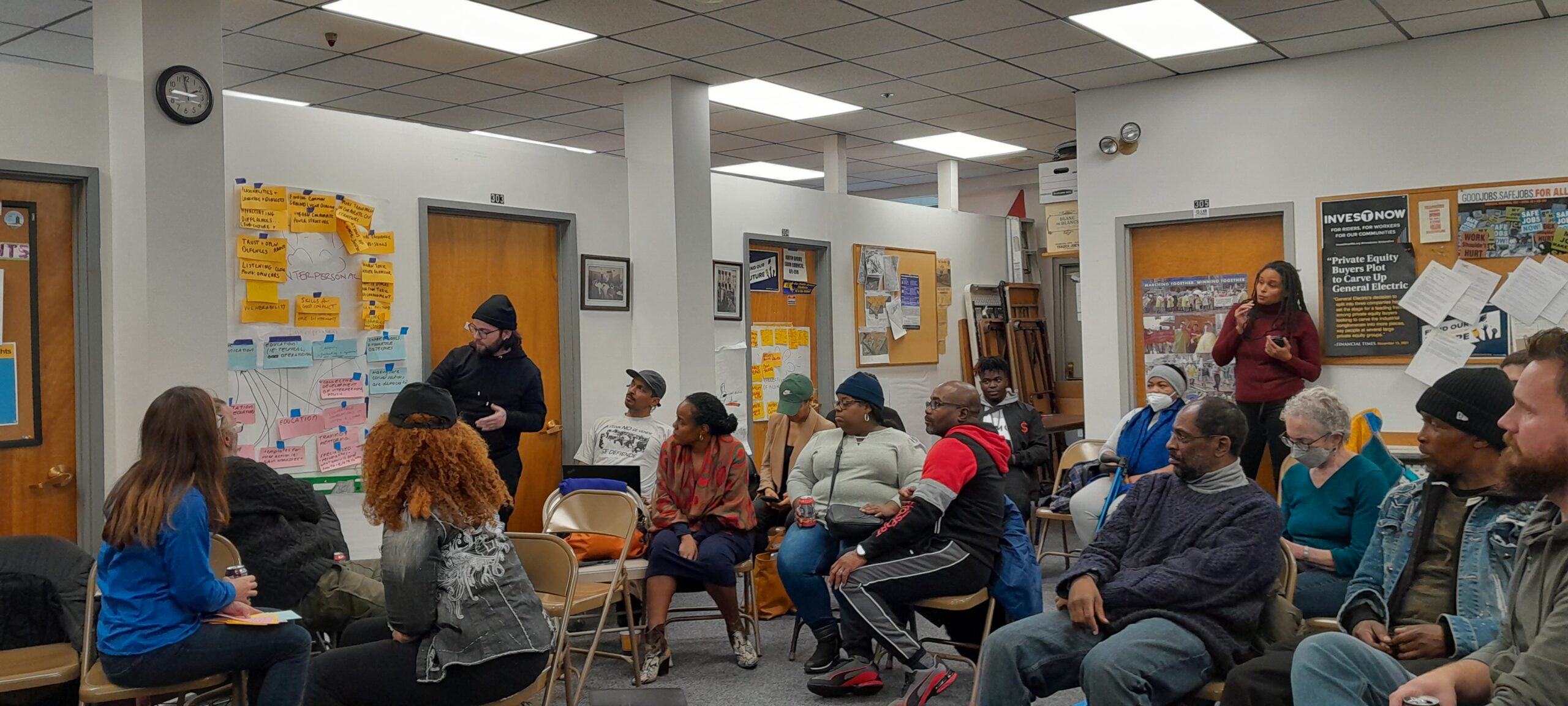Project Description
Rise to Own It –
Levantate para Aduenarnos
Personal transformation was the subject of the “world cafe” modeled conversation I facilitated yesterday in Lynn, MA at the second Rise to Own It gathering organized by the Coalition of Worker Ownership and Power. Other conversations happening simultaneously in the room were about interpersonal, community, and systemic transformation, and each facilitator was following the Theory of Change model popularized by Carol Weiss and other community change agents for sussing out the micro-level elements that lead to long term structural change. This second gathering certainly got to the core elements of what it takes to uplift the cooperative sector of the economy in Massachusetts.
The same group of 10 people sat for a second deeper dive into personal transformation; so energized were we that our translator found herself actively participating and translating (she is seriously talented). We were an ambitious group and decided to address Psychological Safety as an Outcome. This round was to identify activities and outputs that might lead to this outcome. Our first round report-out to the few dozen others in the room was given by the youngest person in our group, a man with the skill to turn conversation into graphic art. He was ready to jump in again with marker and poster paper and the “rules” of the exercise went sideways. Because it was more important for me to do the wrong thing right than to do the right thing wrong—and if you’ve ever been in a space where someone insisted that rules be followed when the energy of a space is clearly on a different trajectory, you know what it feels like to watch good community energy go down the drain—I supported the present energy. Our space was a safe place to disagree, to bumble around a bit, and to bring our hearts forward, even in a non-dominant language.
Psychological Safety as a micro-level element that leads to long term structural change was an evident theme in other report-outs from others in the room. It was evident in the way those of us who struggled to speak received encouragement. It was evident in the time and energy spent on articulating our community agreements—bringing them forward from the last gathering and checking to see if any updates were needed and we found an oversight in not having translated these agreements in advance. Psychological Safety takes so many forms. It is having childcare onsite, it is adequate space and temperature and comfortable chairs, it is having good local food (from a worker owned business), it is taking stretch breaks together, it is prior planning and clarity and consent about how we spend our time and talents together. And Psychological Safety is a little bit different for each of us.
By uplifting and wanting to meet the needs of non-English speakers, breastfeeding mothers, children and movement needs of those with physical challenges, and implicit desire to meet needs less visible, we create Psychological Safety. When we feel okay enough to bring our full selves to a place, we can envision the world we need for worker owned cooperatives and other organizations seeing and meeting needs in small and large spaces across Massachusetts. And we can even laugh together about bad habits like leaving the toilet seat up.
At the moment, the beautiful and ambitious worker cooperative market sector is not adequately supported. When our young and talented people and our not-so-young but very talented worker owners are not well supported, they cannot thrive. This sector is not about exploiting natural and human resources, it is about seeing and making space for the talents within and among us. Cooperatives have unique and powerful governance structures—agreements—that are sacred, that are held together by its members, that serve as their strong foundation to weather the storms bearing down on us. At the moment, the beautiful and ambitious worker cooperative market sector needs preferential consideration to level up.
When a way of governing oneself and one’s business is extraordinary, goes (way) above and beyond the profit modality of capitalism, there are significant and revenue-impacting challenges BECAUSE of the time and space given to activities like self-discipline, learning how to be—and being—vulnerable and transparent with one another, speaking —and listening to another’s—truth even (especially) as the words come out sideways.
Reader, please consider with me the historical leveling up of white home ownership in America. Trust me it is relevant. At various points in U.S. history, when wealthy elites needed the consent of a white majority to refine legislative priorities, they enacted policies to subsidize and level up white home ownership and provide other “safety nets” which gave rise to economic wealth that became—and remains—out of balance. Reflecting on Massachusetts, being the first state in the nation to enact policies, might help us appreciate the potential the Coalition is building here with Rise to Own It—a project funded by a grant from the Government Alliance for Racial Equity. Bishop William Barber speaks perfectly about the systemic racism in our policies at state and national levels which directly cause impoverishment. When we have to fight incredibly hard for what is clearly in the best interest of the people, it’s a sign that we are up close against such policies. And, finally, the recent policy win to formalize the MA Center for Employee Ownership within state government indicates we are beginning to rebalance.
Now consider the impact that giving consideration to worker ownership and the cooperative sector could have. This author, having fully immersed theirself in numerous facets of community economics for decades, KNOWS the direct and dramatic benefits awaiting the Indigenous- and Black- and brown- and women- led entrepreneurial communities—as well as the immeasurable indirect benefits for a healthier and more sane, beautiful and compassionate society, not to mention the gratitude from and relief awaiting our non-human animal and plant kin.
Please brush up on what cooperatives are about if you’re feeling unclear and tell your state (and federal) legislators who represent you to support policies that will help the cooperative sector level up through grants and specialized loan programs along with the technical assistance that will allow our direct service providers and innovative business leaders to fill the alarmingly substantial needs that have not been filled by business as usual.


